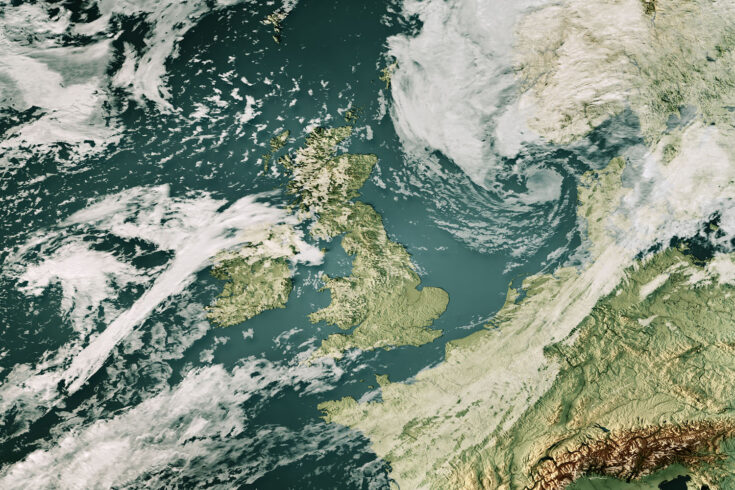The Met Office is a world leader in weather and climate forecasting and is projected to deliver £56 billion of benefits to the UK over the next decade. Long-standing Natural Environment Research Council (NERC) investment and partnership with the Met Office has played a crucial role in this success.
UK benefits worth £56 billion
The Met Office delivers a wide range of benefits to the UK including:
- more resilient communities and businesses
- avoided costs, disruption, illness, deaths
- less pressure on public services and infrastructure
Partnership outcomes
Working together to tackle complex scientific challenges and harness the latest technology, NERC and the Met Office have delivered:
- cutting-edge science including long-term observations (such as ocean conditions), and advances in modelling (for example atmospheric chemistry), that together deliver more accurate simulations of the weather and climate system
- world-class digital capability including joint high performance computing capable of complex climate simulations, and breakthroughs enabling faster and more efficient model calculations
- skilled people including weather and climate scientists and scientific software engineers
Impacts
These outcomes power the Met Office’s world-leading services, delivering impacts such as:
- more accurate weather forecasts and climate predictions. For example, winter conditions can now be predicted one to three months ahead (Met Office) and climate change can now be modelled for UK regions (Met Office)
- climate change decision support tools that provide detailed, localised information to support planning and adaptation. For example, UK Climate Projections (Met Office) and Local Authority Climate Service (Met Office Climate Data Portal)
- space weather forecasts that provide early warning of extreme space weather events (Met Office) that can disrupt critical infrastructure. For example, power grids, satellites and aircraft
Examples of cutting-edge science outcomes
The science has driven multiple improvements to the Met Office Unified Model, which is the basis for weather and climate predictions, including:
Atmosphere-land interactions
The world-leading Joint UK Land Environment Simulator (JULES) model is the core terrestrial component of the Unified Model. JULES is developed by the UK Centre for Ecology and Hydrology (UKCEH), Met Office and partner universities.
JULES simulates flows of energy, water, carbon and nitrogen between the land, atmosphere and soil at different timescales (see the ‘UK Centre for Ecology and Hydrology’ document).
Atmospheric chemistry
Atmospheric chemistry (Research Excellence Framework 2021): atmospheric aerosol particles have a substantial effect on climate. The Global Model of Aerosol Processes was developed by the University of Leeds and replaced a much simpler earlier aerosol model.
Atlantic ocean and jet stream conditions
A global ocean model co-developed by the National Oceanography Centre and the Met Office substantially improved predicted sea surface temperatures.
This is delivering unprecedented forecast accuracy for the North Atlantic and Arctic Oscillations and enabling prediction of mean winter conditions one to three months ahead (see the ‘National Oceanography Centre’ document).
Sea ice
Sea ice (Research Excellence Framework 2021): a more accurate representation of how the atmosphere interacts with sea ice delivered more realistic predictions for wind, temperature and humidity in the lower atmosphere. This improved the accuracy of weather and climate forecasts. Developed by the University of East Anglia in collaboration with the Met Office.
Urban heat
Urban heat (Research Excellence Framework 2021): the Met Office-Reading Urban Surface Exchange Scheme models how buildings exchange heat with the atmosphere.
Co-developed by the University of Reading and the Met Office, it has enabled more accurate urban heatwave predictions and is improving the capability of city authorities to plan for future climate change.
Other science outcomes
The science underpins other aspects of the Met Office’s services too, including:
Flooding
The Flood Forecasting Centre, a partnership between the Met Office and the Environment Agency, uses UKCEH’s Grid-to-Grid model to provide near real-time detailed forecasts. This enables communities, authorities and businesses to prepare for flooding (see the ‘UK Centre for Ecology and Hydrology’ document).
Space weather
The Met Office uses the British Antarctic Survey’s radiation belt model (see the ‘British Antarctic Survey’ document) and British Geological Survey data on geomagnetism and geomagnetically-induced electrical currents in its space weather forecasting and nowcasting system. The Met Office owns space weather risk on behalf of the UK government.
Examples of world class digital capability outcomes
The partnership has also delivered world class digital capability, including:
Monsoon2
Monsoon2: high performance computer capable of complex climate simulations, enabling joint NERC-Met Office work on modelling challenges such as:
- the representation of aerosols and ozone
- the prediction of storms
- increasing the resolution of climate models
Faster model calculations
Faster model calculations (Research Excellence Framework 2021): novel multigrid solvers developed by the University of Bath with the Met Office reduce average model runtime by 13%. This enables higher resolution forecasts and better utilisation of computer resources, saving the Met Office an estimated £300,000 per year.
Faster data refinement
Faster data refinement (Research Excellence Framework 2021): a new method for estimating observation error statistics developed by the University of Reading in partnership with the Met Office. This has increased the accuracy of forecasts and the cost-effectiveness of observations without loss of computational efficiency.
Faster data processing
Faster data processing (Research Excellence Framework 2021): new ways of structuring peta-scale environmental datasets have been replicated by the Met Office and underpin weather and climate research. This has been developed by the University of Reading, the National Centre for Atmospheric Science and partners.
Investing for the future
The partnership continues to push the boundaries of weather and climate science, and to develop new tools for governments, businesses and communities.
Recent joint investments include:
- the UK National Climate Science Partnership
- the UK Research and Innovation Strategic Priorities Fund Climate Resilience
- Clean Air
- Space weather instrumentation, measurement, modelling and risk programmes
- a digital twin programme: Twinning Capability for the Natural Environment

